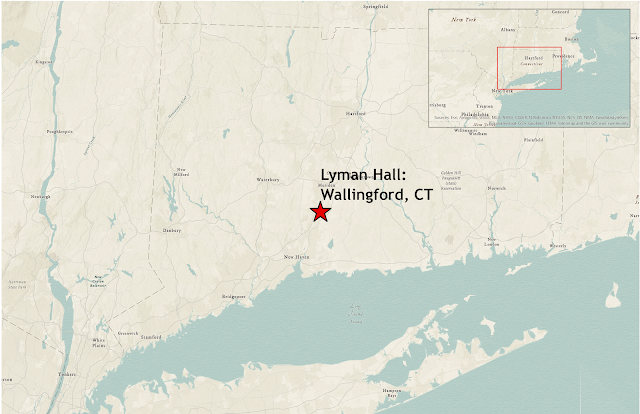Founding Fathers - Lyman Hall
Lyman Hall
Born: April 12, 1724 (Wallingford, Connecticut)
Died: October 19, 1790 (Burke County, Georgia)
This week, as we continue to study the men who signed the Declaration of Independence, our attention settles on the third member of the Georgia delegation. Like so many others who were instrumental in our nation's birth and development, Lyman Hall was a man who was willing to change and move to accomplish his purposes. Born in the spring of 1724 to a minister and his wife, John and Mary Hall, Lyman was a fifth-generation citizen of Connecticut. He received a quality education, not just from Yale where he studied medicine and graduated in 1747, but also from his uncle Samuel, from whom he was mentored in theology. Lyman initially followed in the footsteps of his father and uncle to become a Congregational minister in Bridgeport, CT, but in 1751 he was found to have engaged in immoral behavior. He was removed from his position, but after a heartfelt confession and repentance was allowed to minister in churches with vacant pulpits. The following year he married Abigail Burr, but she died suddenly in 1753 after just a year together.
Heartbroken, Lyman Hall left the ministry and returned to school in order to pursue additional medical training. By 1756 he had graduated once again from Yale and the following year he married his second wife, Mary Osborne, with whom he would later have a son. Hearing of the success of a group of Puritans that had moved to South Carolina, the new couple decided to move south. Shortly after their arrival, the group decided to expand even farther to the sparsely-populated colony of Georgia. The community's choice of location was poor, resulting in a high rate of malaria in their town of Sunbury, but Dr. Hall was able to utilize his skill to treat many of the residents and became well-liked and respected as a result. Politically, the Puritans were very different from the majority of residents in Georgia, many of whom had been treated very well by the Crown and remained staunch Loyalists as the rumblings of dissent grew to their north. Consequently, the colony as a whole did not choose to send delegates to the Continental Congress. Hall had not held any political position but was active in promoting liberty, and as such was nominated by St. John's Parish to represent their portion of Georgia in lieu of an actual colonial delegation. He arrived in Philadelphia in May, 1775, and was accepted into Congress.
Because he recognized that he did not speak for the entire colony of Georgia, Lyman Hall limited his participation to debates rather than voting until a full delegation could be formed. Eventually two others were assigned to join him, and Hall welcomed his close friend Button Gwinnet as well as George Walton shortly before the vote for independence took place. The three signed the document, and Hall remained in Philadelphia for another year before returning to Georgia in 1777. It was a short stay, however, as the British overran Savannah and burned much of Sunbury to the ground, forcing the Hall family to flee north to Connecticut for the duration of the war. When they finally returned after the war was over, Dr. Hall had developed popularity as a signer and he was able to quickly re-establish his medical practice as well as return to a life of public service in Savannah. By 1783 he had been elected as governor of Georgia, and although his one-year term was riddled with difficult issues he did succeed in helping start the process of securing land and funding for what would eventually become the University of Georgia. Once he retired from politics, Hall moved his family to an estate overlooking the Savannah River, where he died in 1790. He was buried on the property, but in 1848 his remains were moved to Augusta, GA, to be placed alongside the state's other two signers.
The signature of Lyman Hall can be found as the second name on the first (farthest left) column beneath the Declaration of Independence.



Comments
Post a Comment